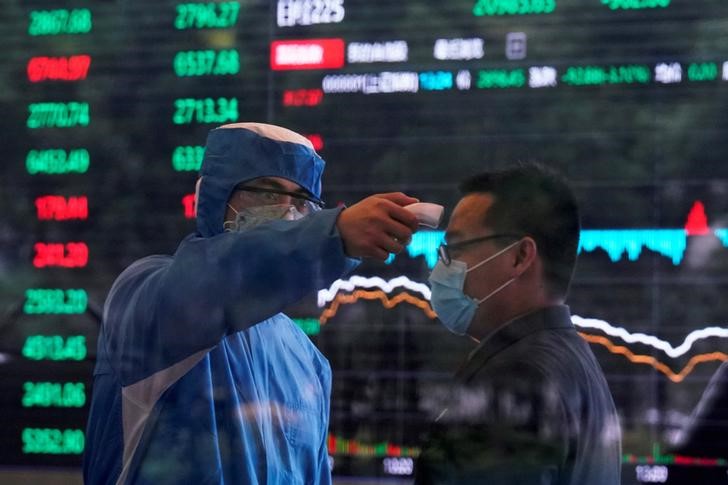By Stanley White and Koh Gui Qing
TOKYO/NEW YORK (Reuters) - Asian stocks gained on Friday as President Donald Trump's plans to gradually re-open the U.S. economy offset data that showed China suffered its worst economic contraction on record due to the coronavirus outbreak.
MSCI's broadest index of Asia-Pacific shares outside Japan (MIAPJ0000PUS) was up 2.6% after reaching a five-week high. Shares in China (CSI300) rose 1.8% as the weak GDP data reinforced expectations that more stimulus is coming, while shares in Australia (AXJO) were up 2.62%.
E-Mini futures for the S&P 500 index (ESc1) traded 3.38% higher, also close to a five-week high.
Data from China showed the world's second-largest economy shrank for the first time since at least 1992 because of the coronavirus outbreak and tough containment measures. Gross domestic product contracted 6.8% in the quarter year-on-year, slightly more than expected, and 9.8% from the previous quarter.
Retail sales also fell more than expected in March, but industrial output only dipped slightly, suggesting its manufacturing sector at least is recovering more quickly.
However, the Chinese data and other forecasts that said the world is in its worst recession in decades caused barely a ripple in Asian shares as investors focus instead on whether the pandemic is peaking and how soon governments will start to ease lockdowns which have crippled business and consumer activity.
Some analysts cautioned, however, that it is premature to say the health crisis is under control.
"Stocks are reacting naturally to Trump's talk of re-opening the economy, because some people don't want to be left out of the rally," said Ayako Sera, market strategist at Sumitomo Mitsui Trust Bank in Tokyo.
"The problem is there is a big gap between expectations and the underlying economic reality, which is that many countries are still very weak."
Shares in Asia got off to a bright start, mirroring gains on Wall Street, as hopes that the United States will roll back restrictions on businesses and reports about a potential treatment for COVID-19 boosted risk appetite.
Joining a handful of other governments that are restarting their economies after mass shutdowns to contain the pandemic, U.S. President Donald Trump said on Thursday U.S. state governors can re-open businesses in a staggered, three-stage process.
Some analysts remain sceptical of Trump's plan, but the equity markets took the comments as a sign that the worst of the pandemic may be over.
"Some believe when the crisis is over, everything will quickly return to what life was like in January, but I think there will be some lingering effects," said Byron Wien, the vice chairman of private wealth solutions at asset manager Blackstone (NYSE:BX) Group Inc.
"I think the recovery will look like a square root sign, a "V" at the beginning and then a gradual recovery."
Equity markets also took the China data in stride partly because it has contained the virus and managed to get large parts of its economy back up and running from a standstill in February.
Japan's Nikkei stock index (N225) rose 2.55% on Friday, while shares in South Korea (KS11) gained 3.27%.
Yields on benchmark 10-year U.S. Treasuries (US10YT=RR) rose slightly from a two-week low in Asia, while Treasury futures (TYc1) fell in another tentative sign of investor optimism. [US/]
The dollar fell against the yen
Spot gold

U.S. crude futures (CLc1) fell to an 18-year low after OPEC's lowering of its global demand forecast, but Brent crude (LCOc1) rose 1.69% to $28.29 a barrel. [O/R]